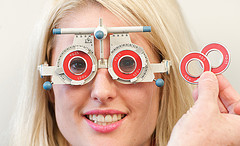Eye Tests, Sight Tests, and Advanced Eye Examinations
 NHS Sight Test
NHS Sight Test
You qualify for a free NHS-funded sight test if:
- you’re aged under 16
- you’re aged 16, 17 or 18 and are in full-time education you’re aged 60 or over
- you’re registered as partially sighted (sight impaired) or blind (severely sight impaired)
- you’ve been diagnosed with glaucoma
- you’re 40 or over, and your mother, father, brother, sister, son or daughter has been diagnosed with glaucoma
- you’ve been advised by an ophthalmologist (eye doctor) that you’re at risk of glaucoma
- you’re a prisoner on leave from prison
- you’re eligible for an NHS complex lens voucher – your optometrist (optician) can advise you about your entitlement
You’re also entitled to a free NHS sight test if you:
- receive Income Support
- receive Income-based Jobseeker’s Allowance (not Contribution-based)
- receive Pension Credit Guarantee Credit
- receive Income-based Employment and Support Allowance
- are awarded Universal Credit
- are entitled to, or named on, a valid NHS tax credit exemption certificate
- you are named on a valid NHS certificate for full help with health costs (HC2)
People named on an NHS certificate for partial help with health costs (HC3) may also get help.
Optometrists recommend that most people should get their eyes tested every two years. However, in some circumstances, they may recommend more frequent NHS sight tests – for example, if you:
- are a child wearing glasses
- have diabetes (and you are not being monitored by a Diabetic Screening Sevice)
- are aged 40 or over and have a family history of glaucoma
- are aged 70 or over.
Private sight test £25.00
What is required in a sight test
The Sight Testing (Examination and Prescription) (No. 2) Regulations 1989 (SI 1230 of 1989), (which apply to both NHS and private patients) say:… when a doctor or optician tests the sight of another person, it shall be his duty-
(a) to perform, for the purpose of detecting signs of injury, disease or abnormality in the eye or elsewhere-
(i) an examination of the external surface of the eye and its immediate vicinity,
(ii) an intra-ocular examination, either by means of an ophthalmoscope or by such other means as the doctor or optician considers appropriate,
(iii) such additional examinations as appear to the doctor or optician to be clinically necessary;
In layman terms this means we check power of eyes to see if spectacles are required.
Then we look at front of the eye to see if it is healthy.
Then we look at back of the eye to see if it is healthy.
We then check that both eyes work together correctly. This is a Binocular vision test.
In patients who are deemed in certain risk categories, such as a family history of glaucoma, we will then check if the pressure in the eye is not too low or too high. This uses a puff of air to check the eye pressure.
In patients who are deemed in certain risk categories, we will assess the visual field using a machine which flashes lights onto a screen.
If the visual fields are failed we can either refer you to your doctor or repeat it again. There will be a fee for any additional appointments.
Advanced Eye Examinations £40.00
Select this if you need any further investigations not covered by the standard NHS sight test, such as any of the following:
Dilation
Special diagnostic drops or dyes
Goldmann Eye Pressure Test
Retinal Photographs
